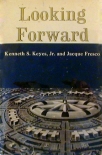Looking Forward by Kenneth Jr. (reading diary .txt) 📕

Read free book «Looking Forward by Kenneth Jr. (reading diary .txt) 📕» - read online or download for free at americanlibrarybooks.com
- Author: Kenneth Jr.
Read book online «Looking Forward by Kenneth Jr. (reading diary .txt) 📕». Author - Kenneth Jr.
If an argumentative person were to use his logical ability and debate the subject of how chameleons should act, it would be hard to convince him that chameleons don’t give a hoot about matching their backgrounds. If you could persuade him to check his thoughts by observation, he would find that a green lizard is perfectly comfortable on a brown background and a brown lizard is perfectly at home on a green background. He’ll even let you photograph him that way.
Anyone who tests his thoughts by using his eyes, ears, touch, smell, or taste is using the method of science. “The scientific method,” says Stuart Chase:
is concerned with how things do happen, not how they ought to happen. Knowledge of the way things do happen, with no ifs, ands, or buts, allows us to deal more effectively with our environment. The method is no more an exclusive matter for professionals than it is a matter of white coats and goggles. Most of us are amateur scientists today, though we are seldom aware of it. ... The scientific method is not primarily a matter of laboratories and atom-smashers or even meter sticks; it is a way of looking at things, a way of gathering from the world outside knowledge which will stay put, and not go wandering off like the wickets in Alice’s croquet game.
Stuart Chase, Tyranny of Words (New York: Harcourt Brace and Company, 1938), pp. 123–24. Reprinted by permission of Harcourt, Brace & World, Inc.
Many people have confused the scientific method with laboratories and test tubes. But a laboratory is only a room where there are special devices for turning up facts. Charles Darwin, who is regarded as one of the world’s greatest scientists, did not use a laboratory. The world was his laboratory. He needed no special apparatus to uncover the facts that suggested and confirmed his theory of evolution. The scientific method is an attitude—a dogged insistence that no matter how right something sounds, we’re going to check it out by observation. Sometimes this means tests, and sometimes it only means opening our eyes to observe facts that have been around us for years. So, if you want to boil down the method of science to one word, it’s simply testing.
As man reaches out toward the twenty-first century, he will learn to be suspicious of all ideas that are not formulated so that they can be tested by observation. He will realize that the history of human thought shows that the ideas of which we are surest are the ones we most need to test. He will realize that his common sense only mirrors his training and experience. What seems natural and right to him is usually a reflection of the conditions under which he spent his first decade of life.
New generations, who will live and breathe the scientific spirit, will supplant us. Prejudice, grasshopper-like guessing, and emotional thinking will be rare. People of the future will, as suggested by John Dewey, achieve “...the habit of suspended judgment, of skepticism, of desire for evidence, of appeal to observation rather than sentiment, discussion rather than bias, inquiry rather than conventional idealizations.” They will know when further logical manipulation is fruitless. They will know when to stop discussing and check the facts. They will be like the proverbial “Man from Missouri”—show me. If they want to know whether a pudding’s good, they won’t just read the recipe; they know that “the proof of the pudding is in the eating.” They will feel, as Karl Pearson does, that, “There is no short cut to truth, no way to gain a knowledge of the universe except through the gateway of scientific method.”
Attitudes that Help Us Develop Reliable Knowledge
In his book How to Develop Your Thinking Ability* one of the authors has described in detail how the scientific method of thought can be used in meeting everyday life problems. Men, women, and children in the twenty-first-century world will probably use these or similar techniques to make the scientific spirit a way of life, not just something they use every now and then. They will hold ideas tentatively, not as bastions to be defended, but as tools to be improved. They will keep their eyes and minds open to find facts that do not support their points of view, for contrary facts may lead them to formulations that have greater predictability.
* Kenneth S. Keyes, Jr., How to Develop Your Thinking Ability (New York: McGraw Hill Publishing Co., 1950).
Because of limitations in our sensory and cortical equipment, no one can know all about anything in this world. All of our senses are limited in range. Dogs can hear higher-pitched sounds than we can. Our eyes can see only a small part of the electromagnetic spectrum. Edison said, “We don’t know one-millionth of one per cent about anything.” Since we can’t know all there is to know about anything we must always keep an open mind for important factors that have been left out of our thinking. Wendell Johnson pointed out, “An attitude of this kind—‘You can’t tell me anything about that’—has an effect quite similar to that of a pus sac in the brain.”
The world in which we live is constantly changing. No object





Comments (0)